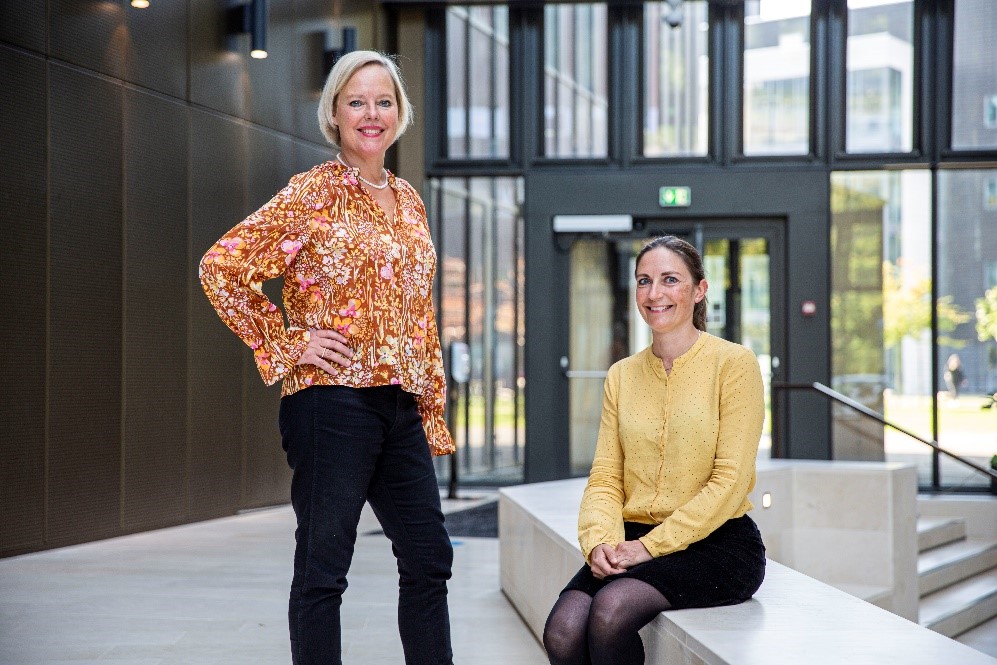Pharma to Strengthen Patient-Centered Pharmacy
Population ageing means more people are treated with different kinds of drugs simultaneously. Treatments must be personalised, and the healthcare system needs more medicinal experts. Now, a new unit strengthens research and education in clinical pharmacy.

Charlotte Vermehren (left) and Anne Byriel Walls (right) are appointed associate professors at Pharma to form a new unit: Clinical Pharmacotherapy Cluster. Photo: Anton Willemann
Charlotte Vermehren, Staff Specialist at the Department of Clinical Pharmacology and manager of the medicine function at Bispebjerg and Frederiksberg Hospital, and Anne Byriel Walls, Clinical Pharmacist at Rigshospitalet, are recruited as Associate Professors in clinical pharmacotherapy. They will continue to work at the hospitals along with their new jobs at the University.
In connection with their employment at the University, a new unit; Clinical Pharmacotherapy Cluster is established, headed by Charlotte Vermehren. The Clinical Pharmacotherapy Cluster is a joint initiative between the Department of Drug Design and Pharmacology and the Department of Pharmacy.
The unit will research how holistic medication reviews that take patients’ wishes and biological data into account can be used to improve treatments and quality of life. Together with Pharma’s other researchers within patient-specific pharmacy (including social, clinical, regulatory and data-driven pharmacy), the unit shall set the agenda for the area and provide teaching and guidance at the pharmacy programme in order to prepare the new graduates for clinical jobs.
‘My biggest ambition is to bring together Pharma's unique forces within the field, ranging from pharmacology and pharmacotherapy to patient involvement and pharmaceutical policy, so that we form a strong, internationally competitive community. We need to strengthen research and education as to how we use drugs in the treatment in order to ensure that the healthcare system will see less over-medication and fewer medication errors’, says Charlotte Vermehren.
The Medicine Expertise of the Pharmacists Shall Benefit More Patients Clinical pharmacy and pharmacotherapy, where drug-specific professional competencies are brought into play at hospitals, are developing rapidly. In particular, there has been an increased need for medication reviews of patients and counselling of health professionals. The number of clinical pharmacists employed at hospitals has increased by 78 percent since 2008.
The same development is reflected in the latest surveys of what graduates from the UCPH pharmacy programme are working with. The graduate survey from 2018 showed for the first time that more MSc Pharmacy graduates are employed in the regions than in private pharmacies.
‘It is crucial that our research and programmes support that development. We have one of the world's best pharmaceutical programmes, and that expertise must benefit the patients as much as possible. This will become increasingly important as we see more patients with multiple diseases and, at the same time, have new technological possibilities to adapt the medicine to the individual patient’, says Professor Helle Waagepetersen, Head of the Department of Drug Design and Pharmacology.
What are Pharmacists Doing at Hospitals? The forecasts say that one in four Danes will be over 65 years old in 2050. As of today, approx. every other Dane over the age of 65 has more than one diagnosis. This increases the frequency of cases where, for example, one doctor prescribes medication for high blood pressure, another for diabetes and a third for arthritis. The doctors act with great expertise based on the guidelines of the individual areas of specialisation, but the patient may end up taking large quantities of various drugs and experience unforeseen side effects.
Therefore, the hospitals are increasingly hiring pharmacists to talk to patients about their overall medication, to process test data and to spar with physicians and nurses about systematising treatments. Whether this does indeed make a difference will be investigated by Charlotte Vermehren and Anne B. Walls and others, but the thesis is clear:
‘Pharmacists are drug experts across diseases and medical specialties. That is our core competency, and drugs are included in almost all treatments. Therefore, I see clinical pharmacists as those who can build bridges between the patient, the doctors, the nursing home and other players in the healthcare system. If we can collaborate, involve the patients and work based on data, then we can tailor more efficient treatments for the individual’, says Charlotte Vermehren.
About Pharma at the University of Copenhagen Pharma at SUND, UCPH conducts research into the development and use of drugs and offers one of Denmark's two five-year master's programmes in pharmacy as well as several continuing/further education courses. Within its field, Pharma is on the top 25 list among the most recognised university rankings.
Every year, approx. 170 people graduate in pharmacy at the University of Copenhagen. About 65 percent work in the pharmaceutical industry, approx. 20 percent are employed at hospitals and approx. 15 percent at private pharmacies. The programme has existed since 1892.
By Barbara Kjølbye Zinckernagel
